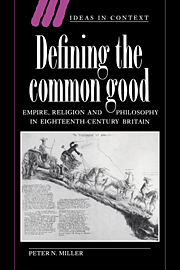Book contents
2 - A classical landscape
Published online by Cambridge University Press: 23 October 2009
Summary
PATRIOTISM, PARTY AND PITT
The Revolution of 1688 installed a new dynasty. After its failure, parliament legislated for the future of the succession. In 1707 the Anglo–Scottish Union was confirmed by the respective parliaments. These events permanently altered the landscape of political debate in what was now called Great Britain. The events of 1688–9 remained the touchstone of political argument throughout the century that followed. The extent of the aftershocks can be gauged from the new regime's continuing need to defend its legitimacy and assure itself of the loyalty and obedience of its subjects. Thus Edmund Burke, in his Appeal from the New to the Old Whigs (1791), affirmed the principles of British politics against the French revolutionaries by explicitly returning to the Whig vision of 1688 and reviewing the arguments of the Sacheverell trial. While the language of the ‘public good’ and necessity’ remained current, as politicians dealt with ‘normal’ rather than revolutionary events, it was now used more and more in its original context, the justification of political practice. Politics in eighteenth–century Britain has conventionally been framed in terms of party: the absence, disappearance, fragmentation or revival of party has structured the most important and incisive examinations of its political culture. The conditions of party politics raised the same questions about the conflict between the useful and the good that, in the seventeenth century, often issued in open warfare.
Information
- Type
- Chapter
- Information
- Defining the Common GoodEmpire, Religion and Philosophy in Eighteenth-Century Britain, pp. 88 - 149Publisher: Cambridge University PressPrint publication year: 1994
